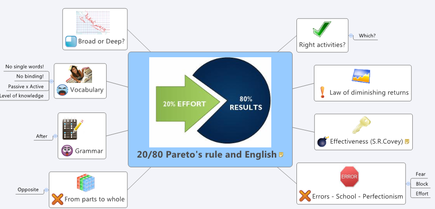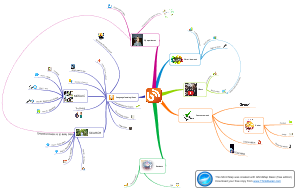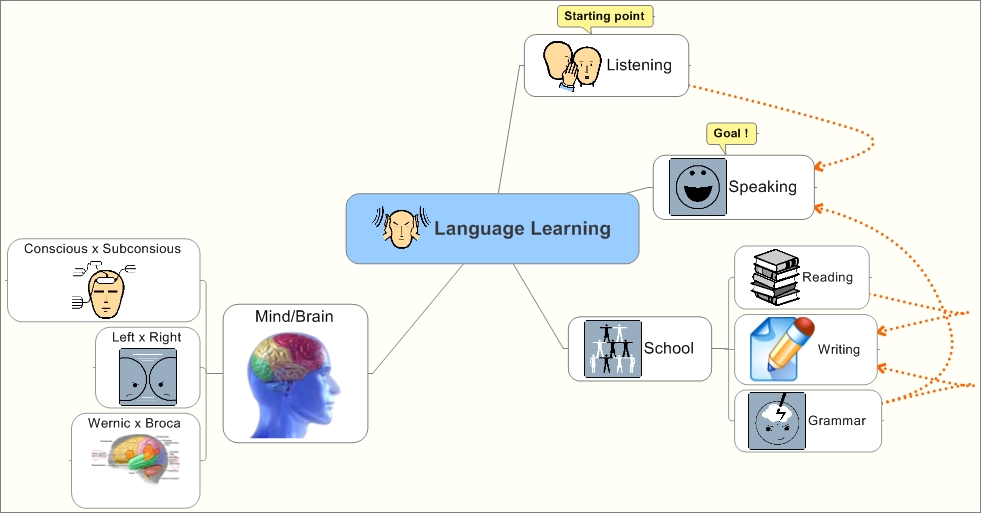An Italian economist Vilfred Pareto (you can Google more) discovered that roughly 80% of the effects come from 20% of the activities. Does this rule applies to learning languages, in our case English? It goes without saying! Of course it applies. 20% of our learning activities bring us 80% of results. But a BIG question is: What are those activities?
| 80_20_map_english.png |
In this post I will give you some of my opinions concerning especially learning the VOCABULARY. Some of them might be true, some of them need your correction which is welcome.
Learning vocabulary the way we usually do does NOT belong to those 20% (green) activities which bring so good results. I see here at least these problems:
b) bind strangely those words together which are not meant to be binded (collocate) in language naturally
b) for us as unique human beings
This is only a few points, maybe you can find more and I would be able probably too, but for our purposes it is already enough to say that this is not the right way to learn foreign vocabulary. Sorry guys.
I would suggest at least these modification:
So, what is that Pareto's rule as far as vocabulary and language learning is concerned?
In essence it is: Learning by the ears from native speakers in bigger language units repeatedly interesting materials and delegating most of time consuming repetitive activities to subconscious mind. Speaking comes later – using proper methods. And what about the grammar? I would say that it comes last (some say not necessary at all)
Learn the language not about the language! Learn by doing. Learn the particular activity by doing that particular activity itself. And it was my case today.
Thank you for that opportunity.
Learning vocabulary the way we usually do does NOT belong to those 20% (green) activities which bring so good results. I see here at least these problems:
- It is boring ;-) The boredom closes our memory – and learning is hard and slow (unnecessarily)
- We mix languages together and this way we:
b) bind strangely those words together which are not meant to be binded (collocate) in language naturally
- We learn all words the same way. We do not distinguish between the passive and the active vocabulary at all
- We do not care about importance of particular words
b) for us as unique human beings
- We try to „master“ the vocabulary perfectly (see also the law of diminishing effect by Pareto too)
- We learn without proper listening before and it lead to „creation of our own pronunciation“ - and because of it we do not understand well and we are not understood too
This is only a few points, maybe you can find more and I would be able probably too, but for our purposes it is already enough to say that this is not the right way to learn foreign vocabulary. Sorry guys.
I would suggest at least these modification:
- Do not learn single words. In language are single words very very rear. In most cases are these words together and create sentences and sentences are in paragraphs and bigger units. The language is a big unit and you want to learn it.
- Lean worlds more like synonyms towards your native words, do not bind them together, instead imagine the meaning of that particular word. Learn meaning of all that text. You can mark some words which are more difficult for you (or interesting) of course. But do not do classical repetition of foreign-native-foreign-native... It brings the biggest problems, in my opinion.
- Lean the important words more. You may ask: But I do not know which ones are those important words. You do not need to know that. What you need is to find some material you are interested in (in English) which is narrated by some native speaker. It may be an audio-book for example. You need the text version too. And you need to listen. The more important and more frequent words will be repeat itself more often. The subjectively important words (for you) will be present there more too, because it is material you like, you are interested in (so, there is no boredom)
- Lean by your ears first to get the proper pronunciation – so listen again.
- Listen repeatedly, but in most cases that repetition should be kind of in the background listening. You can do other activities at the same time. After understanding the material, you can continue to listen it without paying attention to it = let you subconscious mind to finish the job. It may need some practice.
- Do not try to be perfect, do not try to avoid errors. Prefer fluency, spontaneity and playfulness. Enjoy the activity.
- After a PROPER listening you can start to speak a bit. You can use our method for example to activate the active vocabulary inside of you. (First you need to have something inside of you and you need to know how to pronounce it) This way, you will create you own active vocabulary. Implicitly. Again you do not need and you cannot know actually beforehand which words will be that active vocabulary. It will be created naturally.
So, what is that Pareto's rule as far as vocabulary and language learning is concerned?
In essence it is: Learning by the ears from native speakers in bigger language units repeatedly interesting materials and delegating most of time consuming repetitive activities to subconscious mind. Speaking comes later – using proper methods. And what about the grammar? I would say that it comes last (some say not necessary at all)
Learn the language not about the language! Learn by doing. Learn the particular activity by doing that particular activity itself. And it was my case today.
Thank you for that opportunity.





 RSS Feed
RSS Feed


